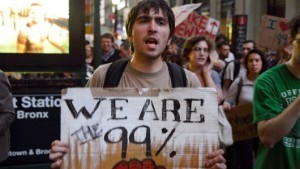Occupy What?
 Ok, so a few inquiring minds want to know what I think of OWS?
Ok, so a few inquiring minds want to know what I think of OWS?
Answer: A lot of things.
That some Americans have finally woken up to the fact that we are living through the most radical transfer of wealth upward in history is a very, very good thing. That some people are willing to do something about, even if it is only pitching a tent, well that is also a really good thing.
That OWS has informed the entire national debate and all of a sudden everyone from politicians to a sleepy MSM has discovered that there's a growing wealth divide threatening a new generation is very good news.That it is no longer cool to be a Gordon Gekko-type a-hole is refreshing, All of these should be chalked up as victories by OWS.
Now, comes the hard part. When engaging in politics, one should never confuse a tactic with a strategy. And that's the danger facing OWS. Here's an historic case in point:
Let's go back to The Battle in Seattle around the WTO in 1999. Here's a giddy piece I wrote for The Los Angeles Times from the scene if you can't remember exactly what happened. Rather magically, the first great mass demonstration against "globalization" materialized in the streets of Seattle and unionists and greens stood shoulder to shoulder through the tear gas as the police predictably over-reacted.
For the next number of years, young activists replicated these tactics by massing every time the WTO or G8 met and the symbols of the movement became handcuffs and tear gas masks. But what was the strategy? A few hundred or even a few thousand protesters clashing with cops from Cancun to Seoul to Toronto and back was a pain in the butt for the global elite but it hardly impacted their own strategies. What made some difference, however, were those less dramatic but more effective campaigns (usually unsuccessful) to stop the onrush of free trade agreements and preferred trading status for China.
Certainly, there was some overlap among the street fighter and the legislative crusaders as there damn well should have been ( a suites/streets strategy). When it came to free trade, Seattle and some of the other protests put the issue on the map, but it took a much larger and strategic coalition to try and actually do something about the issue. Back in those early days of the of anti-globalization fight, I attended a ton of the street heat meetings as a reporter and I am sorry to say that the discussion rarely, if ever, went beyond tactics i.e. how to get arrested, how to sit-in, whether or not it was OK to smash windows (thanks to the so-called Black Bloc anarchists and so on). It was mostly the trade unions, however, working with some populist politicians who did the heavy lifting on the policy front.
I think we are now at that same crossroads with OWS. It was an absolutely necessary eruption that forced the central but unspoken issues of our time on to the center stage. Indeed, what has been achieved is so important that it is now imperative that the victory not be sacrificed by continuing to focus on tactics. Translation: letting this movement descend into a prolonged cat and mouse battle over physical space, tents and parks would be tragic. The fight for physical space is not only unsustainable, it is also politically insufficient and ineffective. The more OWS becomes about itself, the more it looks inward, the more pointless it will become.
OWS must look outward. It must build real coalitions. To say it represents the interests of 99 percent of Americans might be a political truth. To say, however, that OWS is the 99 percent is ridiculous and only serves to self-mock the movement. In New York, a few of the protest marches might have involved 20-30,000 people. But in most cities, and certainly here in Los Angeles, the campers and overnighters rarely reach beyond the hundreds.
If OWS aspires to embody the 99 percent then it is going to have to do the dirty work of reaching out to that other 98.9 per cent who have not yet participated. OWS is going to have to make itself more accessible to folks who are NOT full-time activists. The tribal aspect of OWS, the concentration on camp kitchens, libraries, etc. are quaint but wholly irrelevant. They are ingrown and exclusionary.
As Lennon and McCartney said, "if you go carrying pictures of Chairman Mao you're not gonna win anyone over anyhow." For OWS, this means, yes, mainstreaming itself some more. It means not insisting that you join a tribe and participate in a human microphone to be part of it. It means looking for allies and meeting them half-way or at least part of the way.
This is not a covert suggestion, by the way, that OWS convert itself into some sort of electoral vehicle — at least not exclusively one. Who can have faith in the political system? Yet, it happens to be the only one we have. So figuring out how to influence and impact that system of power is a looming question for OWS. It cannot just be ignored. After all the system is the power. And we are talking about power, aren't we?
I have no prescriptions or paint-by-numbers scheme for OWS. I can't tell you exactly what it should do next. I only know what it shouldn't do. It must not close in on itself and make itself the issue. The parks don't matter.
Power matters.
Marc Cooper's Blog
- Marc Cooper's profile
- 4 followers



